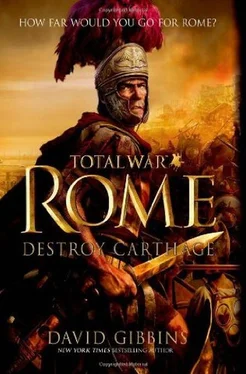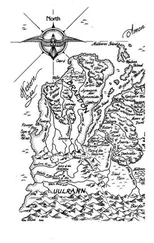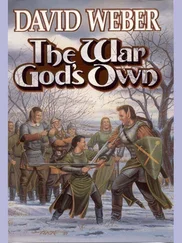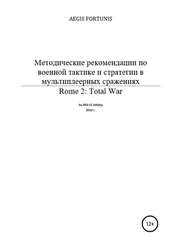David Gibbins - Total War Rome - Destroy Carthage
Здесь есть возможность читать онлайн «David Gibbins - Total War Rome - Destroy Carthage» весь текст электронной книги совершенно бесплатно (целиком полную версию без сокращений). В некоторых случаях можно слушать аудио, скачать через торрент в формате fb2 и присутствует краткое содержание. Год выпуска: 0101, Издательство: Thomas Dunne Books, Жанр: Исторические приключения, на английском языке. Описание произведения, (предисловие) а так же отзывы посетителей доступны на портале библиотеки ЛибКат.
- Название:Total War Rome: Destroy Carthage
- Автор:
- Издательство:Thomas Dunne Books
- Жанр:
- Год:0101
- ISBN:нет данных
- Рейтинг книги:5 / 5. Голосов: 1
-
Избранное:Добавить в избранное
- Отзывы:
-
Ваша оценка:
- 100
- 1
- 2
- 3
- 4
- 5
Total War Rome: Destroy Carthage: краткое содержание, описание и аннотация
Предлагаем к чтению аннотацию, описание, краткое содержание или предисловие (зависит от того, что написал сам автор книги «Total War Rome: Destroy Carthage»). Если вы не нашли необходимую информацию о книге — напишите в комментариях, мы постараемся отыскать её.
Total War Rome: Destroy Carthage — читать онлайн бесплатно полную книгу (весь текст) целиком
Ниже представлен текст книги, разбитый по страницам. Система сохранения места последней прочитанной страницы, позволяет с удобством читать онлайн бесплатно книгу «Total War Rome: Destroy Carthage», без необходимости каждый раз заново искать на чём Вы остановились. Поставьте закладку, и сможете в любой момент перейти на страницу, на которой закончили чтение.
Интервал:
Закладка:
The story of the Punic Wars has huge resonance today, with some lessons that have been learned well, others less so. The decision to leave Carthage intact at the end of the Second Punic War can be compared with the decision by the Allies not to conquer Germany and instead accept an armistice at the end of the First World War, or the decision by the US-led coalition to stop short of the invasion of Iraq at the end of the Gulf War in 1991; in both cases the decision to hold back led to far more costly and devastating war years later. Archaeology has revealed that despite the defeat of Hannibal, Carthage rebuilt her war harbour unhindered by Rome, just as the Allies stood by while Hitler rebuilt the German navy and air force in the 1930s. In many ways, the Punic Wars were the first true world war, the first ‘total’ war, encompassing more than half the ancient world and with repercussions far beyond the west Mediterranean. Just like the world wars of the last century or the present global war against terrorism, the main lesson of history is perhaps that war on that scale leaves little room for concession or appeasement. Total war means just that: total war.
Distances
The basic unit of Roman linear measurement was the foot ( pes ), divided into twelve inches ( unciae ), roughly similar to the units we use today. For longer distances they used the mile ( milliarum ), a distance of 5,000 pedes, so just over nine-tenths of a modern mile or about one and a half kilometres. An intermediate unit of Greek origin was the stadium (plural stadiae, derived from the Greek stadion, a racing track), about 600 pedes, so a little under an eighth of a mile or a fifth of a kilometre. In translation it is common to use the Anglicized stade and stades, as in this novel.
Dates
The Romans dated years ab urbe condita, ‘from the founding of the city’ in 753 BC, but more commonly used the ‘consular year’, naming the two consuls in office at any one time. Because the consuls changed annually and in theory no two men could hold the office twice, the consular date gave a unique year. It was often necessary to spell out the full names because of the dominance through the Republican period of men from a small number of gentes such as the Scipiones, so it might not be enough to say ‘in the consulship of Scipio and Metellus’; the full names would have to be given.
Gens
The gens (plural gentes ) was the family of a patrician Roman. A person might be from an established branch of a gens, so that, for example, Scipio Africanus was from the Scipiones branch of the gens Cornelii, and Sextus Julius Caesar from the Caesares branch of the gens Julii. The gentes can be compared with the aristocratic families of Europe in recent centuries, although for the Roman gens behaviour was even more formalized and restrictive — governing, for example, marriage as well as rights and privileges. Most of the main players of the Roman Republic came from a small number of gentes, so that names such as Julius Caesar and Brutus that have such historical resonance for the Civil War period crop up frequently in preceding generations, often with similar prominence and fame.
Names
Romans could be known among friends by their praenomen (first name), just as we are today, though they could be also known by their other names, in the case of Scipio his cognomen (third name), which was a common usage among aristocrats. The cognomen was the branch of the family ( gens ) that was revealed in the second name; thus the Scipio of this novel, Publius Cornelius Scipio, was from the Scipiones branch of the gens Cornelii. The Cornelii Scipiones were not the gens into which he had been born, as he had been adopted by the son of the famous elder Scipio, Publius Cornelius Scipio Africanus, when he was a small child: however, following custom, the younger Scipio also retained the gens name of his real father, Lucius Aemilius Paullus Macedonicus. Just as Aemilius Paullus had been awarded the agnomen Macedonicus for his triumph over the Macedonians at Pydna in 168 BC, so the younger Scipio’s full name in 146 BC, Publius Cornelius Scipio Aemilianus Africanus, included the agnomen Africanus inherited from his adoptive grandfather after he had been awarded it following the Battle of Zama in 202 BC. The burden of expectation that this name put on Scipio as a young man, and his efforts to earn it in his own right, form an underlying theme of this novel.
Characters
The following are historical characters unless they are noted as fictional; the biographical notes go up to 146 BC. The names are those used in the novel, followed by their full name where known.
Aemilius Paullus— Lucius Aemilius Paullus Macedonicus (c. 229–160 BC), father of Scipio and distinguished general who defeated the Macedonians at the Battle of Pydna in 168 BC.
Andriscus— Ruler of Adramyttium in Asia Minor who claimed to be the son of Perseus, was briefly self-appointed king in Macedonia and was defeated by the Romans under Metellus at the second Battle of Pydna in 148 BC.
Brasis— Fictional gladiator, a former Thracian mercenary captured in Macedonia.
Brutus— Decimus Junius Brutus, a fictional son of the historical Marcus Junius Brutus, of the gens Junia; a friend of Scipio and commander of the Praetorian Guard at the siege of Carthage.
Cato— Marcus Porcius Cato (c. 238–149 BC), famous elder statesman of the Roman Senate who repeatedly called for Carthage to be destroyed, ‘Carthago delenda est’.
Claudia Pulchridina— Of the gens Claudia, fictional wife of Scipio by arranged marriage; her name means ‘beautiful’.
Demetrius— Demetrius I, later named Soter (‘Saviour’); contemporary of Scipio Aemilianus, a scion of the Seleucid dynasty held hostage in Rome during his youth. He became king of Syria from 161 BC.
Ennius— Ennius Aquilius Tuscus, a fictional scion of the original Etruscan branch (the Tuscii) of the gens Aquilia; a close friend of Scipio and commander of the fabri, the army engineers.
Eudoxia— Fictional British slave girl and friend of Fabius.
Fabius— Fabius Petronius Secundus, a fictional legionary from Rome who is the bodyguard and friend of Scipio in the novel.
Gaius Paullus— Gaius Aemilius Paullus, fictional cousin of Scipio on his father’s side.
Gnaeus— Gnaeus Metellus Julius Caesar, of the gens Metelli. Fictional son of Metellus and Julia whose true paternity is revealed in the novel; present as a tribune at the siege of Carthage.
Gulussa— Second son of Masinissa, sent by his father to Rome in 172 BC to present the Numidian case against Carthage; on Masinissa’s death Scipio made him commander of the Numidian forces, which he led in the siege of Carthage.
Hasdrubal— General who defended Carthage in 146 BC; the fate of his wife and children is described by the historian Appian.
Hippolyta— Fictional Scythian princess who joins the academy in Rome and later leads the Numidian cavalry alongside Gulussa in North Africa.
Julia— Fictional daughter of the historical Sextus Julius Caesar, from the Caesares branch of the gens Julia; friend and lover of Scipio, but betrothed to Metellus.
Читать дальшеИнтервал:
Закладка:
Похожие книги на «Total War Rome: Destroy Carthage»
Представляем Вашему вниманию похожие книги на «Total War Rome: Destroy Carthage» списком для выбора. Мы отобрали схожую по названию и смыслу литературу в надежде предоставить читателям больше вариантов отыскать новые, интересные, ещё непрочитанные произведения.
Обсуждение, отзывы о книге «Total War Rome: Destroy Carthage» и просто собственные мнения читателей. Оставьте ваши комментарии, напишите, что Вы думаете о произведении, его смысле или главных героях. Укажите что конкретно понравилось, а что нет, и почему Вы так считаете.












